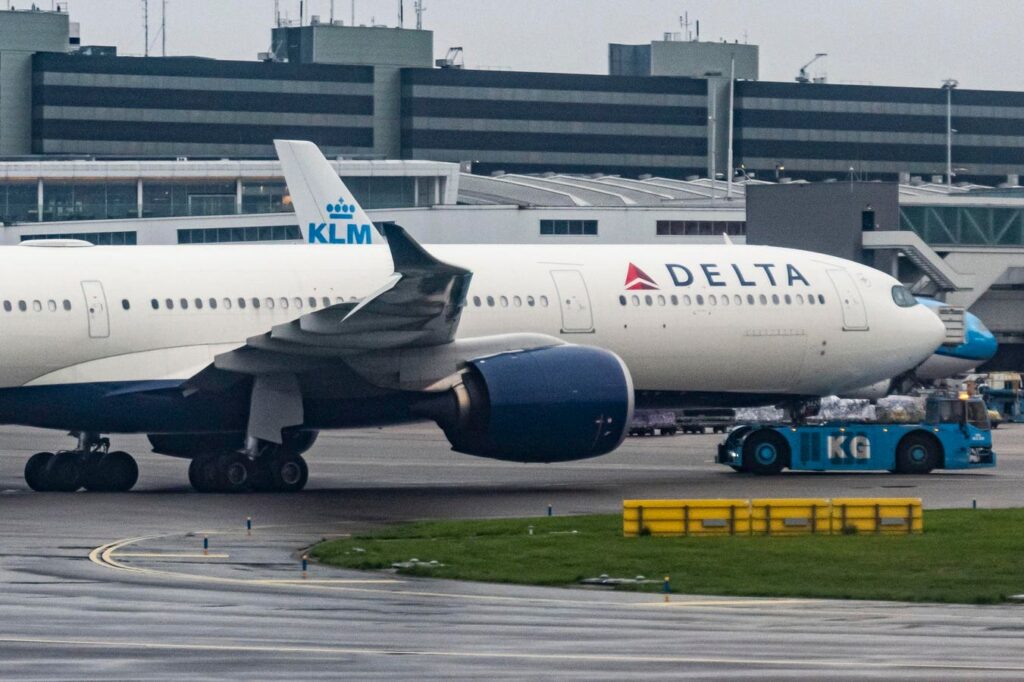A Delta Air Lines Airbus A330-900neo heads for the gate in Amsterdam in April 2024. (Photo by … More
Delta Air Lines on Wednesday generally confirmed the diminished expectations for U.S. airlines, which have become performers in a tariff drama.
“Growth has largely stalled,” Delta said Wednesday, as it became the first carrier to report first quarter earnings. It cited “broad economic uncertainty around global trade” as the cause for the showdown.
“Given the lack of economic clarity, it is premature at this time to provide an updated full-year outlook,” Delta said in a prepared statement, noting that it “will reduce planned capacity growth in the second half of the year to flat over last year.”
In a Wednesday morning interview on CNBC, Delta CEO Ed Bastian said the carrier is “taking second half growth out of our plan. We had expected to grow 4%.”
Bastian said that in the President Donald Trump’s first term, the administration had been “quite helpful” in addressing the problem caused by Mideast carriers Emirates, Etihad and Qatar dumping subsidized capacity in U.S. markets.
Referring to the tariff battle, he said, “Trying to do it all at the same time has created chaos. Everything a stall. There’s been a freeze. Our economy’s going to continue to lose steam.”
For Delta, he said, the biggest impact has been in the domestic market, where the carrier has its most price-sensitive passengers. As for international, he told CNBC host Phil LeBeau, “U.S. consumers are looking to go somewhere, particularly to try to get a reprieve from all the craziness we’re going through.” About 80% of Delta international sales are made in U.S. markets.
On the earnings call, Delta President Glen Hauenstein said he sees international bookings “remaining strong for the peak summer period.”
In the first quarter, Pacific revenue grew 16% on double-digit capacity growth, with unit revenue inflecting positive. Transatlantic revenue was up 5% over the prior year, with unit revenue up 8%. Latin America revenue grew 5% over prior year with modestly negative unit revenue growth.
In a note issued following the earnings release, Cowen analyst Tom Fitzgerald wrote, “The airline sector is in the eye of the storm, but we believe Delta to be a better port in the storm than many peers due to its revenue diversity and balance sheet strength.
“We are encouraged by management’s emphasis on protecting margins and cash flow and their intention to reduce 2H25 capacity growth to flat y/y,” Fitzgerald wrote. “We expect this to be the first of many 2H25 capacity reduction announcements from the airlines this quarter.”
During the quarter, net income was $240 million, up from $37 million in the same period a year earlier. Revenue rose 3% to $12.99 billion. Delta earned adjusted earnings per share of 46 cents, ahead of estimates of 38 cents. TRASM, or total revenue per available seat mile, fell 1%. Cost per available seat mile rose 2.6%.
On the plus side, American Express remuneration of $2 billion was a March quarter record, up 13% year-over-year
Looking ahead, current quarter revenue is expected to be between down 2% and up 2%. “2025 is playing out differently than we expected at the start of the year,” said President Glen Hauenstein, in a prepared statement. “As a result, we are adapting to current conditions while staying true to our long-term strategy.”
Bastian said Delta expects to retain its stature as the leading U.S. airline. “Given our position of strength, our bias toward action and the decline in fuel prices, Delta remains well positioned to deliver solid profitability and free cash flow for the year,” Bastian said in a prepared statement. “I expect that our financial results will continue to lead the industry.”
At the close on Tuesday, Delta shares were down 39% year-to-date. At midday on Wednesday, Delta shares were up about 6.%.
Read the full article here
